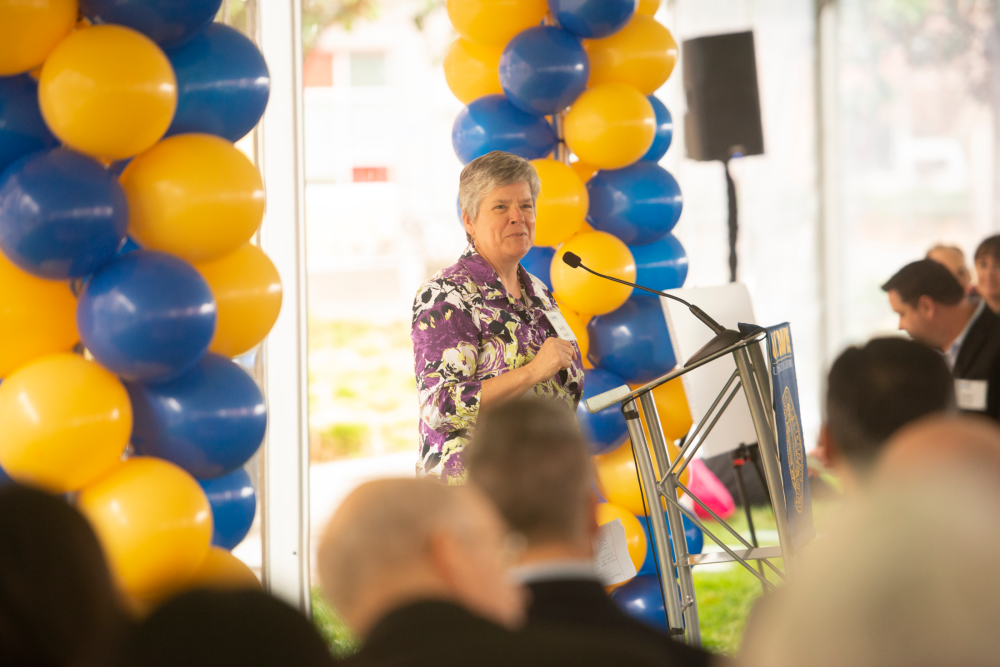An Aggie Career: Reflecting on Kelly Ratliff's 35 years of service to UC Davis
Managing campus budgets and financing kept Kelly Ratliff working on the third floor of Mrak Hall for most of her career, but her impact can be seen throughout UC Davis, from the Mondavi Center to Aggie Square, from university police reform to COVID-19 testing.
Here’s a look at how Ratliff went from a first-year student living in Tercero to vice chancellor, spreading her own brand of warm, pragmatic, smart leadership over a 35-year career at UC Davis.
Starting out an Aggie

Fresh out of a 4-H childhood and high school in San Jose, Ratliff came to UC Davis in 1982 to get a bachelor’s degree. While annual tuition looked totally different back then — less than one-tenth of today’s costs — the campus itself had some of its same beloved features like the Arboretum oaks, cows in the campus dairy, a skyline dominated by water towers and the classic Rec Pool.
She put herself through school with a job at Bank of America and majored in zoology, intent on becoming a veterinarian. Her first job on campus after graduating was as a principal clerk for the California Veterinary Diagnostic Laboratory System.
"I was trying to go to vet school. That was the failure of my life, but it turned out OK,” Ratliff said. “It eventually became clear that I had an interest and an aptitude for the business side of things."
So she earned an M.B.A. from the Graduate School of Management, while accruing administrative experience in the lab’s backrooms. In 1996, she landed a job as a budget analyst in the campus Planning and Budget Office, located in Mrak Hall on the third floor — the same floor where she will spend her final days working before retirement as vice chancellor.
Helping finance campus landmarks

As a budget analyst and then budget director, Ratliff quickly became an expert in specific campus budget and financing issues, with impacts that helped raise many of today’s major campus buildings.
She had a chance to help with financing plans to build the Mondavi Center — which had its groundbreaking in 2000, even before some of its major philanthropic gifts were received.
And her expertise in what was called Garamendi-style financing was integral in the construction of the $95 million Genome and Biomedical Sciences Building, opened in 2004 to house leading-edge research including the Genome Center (which is now also home to the lab that processes campus COVID-19 saliva tests).
Giving voice to the budget
Many UC Davis employees first met Ratliff during meetings about campus budgets, where she was adept at distilling a complex, billion-dollar budget into a 2-page explanation.
“The way we tell the story of the budget from a campus level, that’s something I really gave a personality to. I can explain it in a way that people understand it, and it comes across as honest — which, thank goodness, because it is,” she laughed.
“People say to me, ‘You always make it sound so believable.’ Why would it sound anything other than believable? It’s the truth. It’s all I got!”
Those practical explanations were critical during years of dramatic state budget cuts in the mid-90s and ’00s, but they also helped reframe constant budgetary pressure felt by UC Davis as traditional state funding for public universities didn’t keep up with rising costs – and student tuition and fees eventually eclipsed state funds as the university’s major source of income.
In 2013 as associate vice chancellor for Budget and Institutional Analysis, Ratliff was part of a small team who took on the monumental task of implementing a new budget model for UC Davis in just 16 months, to give campus leaders at all levels greater predictability and transparency in the annual budget process.
“It was a pretty fundamental change in approach, which created a framework for how revenues would flow as we grow,” Ratliff said. “It didn’t move a ton of dollars around, but the new model changed our budgeting framework and the underpinnings have pretty much stayed in place since we made those changes.”
Building a legacy of putting people first
In 2016, Ratliff was first appointed to lead the Finance, Operations and Administration division, an interim position later made permanent. Her first accomplishment?
“Building a team — that’s what stands out,” Ratliff said.
“I’m quite proud of my team and the relationships that I have fostered throughout campus that favor collegiality over competition and put people (especially staff) first. I hope that I have influenced the culture in a way that will have staying power," she said.
Teamwork can be especially important to keeping FOA’s 13 distinct units running smoothly, with more than 1,600 employees who steward campus resources across many dimensions — including the Arboretum, budget, campus planning, construction, custodial services, event services, human resources, space management, supply chain, transportation services, and the campus police and fire departments.
Growing a culture of service was another essential aspect of Ratliff’s leadership of FOA. She championed the Academic and Staff Satisfaction Survey as a management tool to help improve campus services, which expanded to services outside of FOA after its initial launch. She also oversaw the final steps of unifying shared HR services between the Davis and Sacramento campuses and switching over to the systemwide UCPath — including making an important decision to delay initial implementation.
Serving students with transparency
When it comes to serving students directly, Ratliff has enjoyed having students shadow her work every quarter and has been a consistent advocate for career pipelines and student employees in FOA (about 250 students work in the division).
Her longtime role of explaining the budget has kept her meeting with student groups as well—often providing clarity on questions related to student fees, most recently regarding remote learning refunds and Intercollegiate Athletics budgets.
Perhaps lesser known, she has also taken on a special role in coordinating progress toward campus safety reform, including leadership of the UC Davis Police Department’s Transparency Dashboard — a feature specifically requested by ASUCD’s student representatives.
“I’m working to support our police department while making sure that we’re pushing for as much change as we can, which our community is saying is needed,” she said. “As the vice chancellor, I’ve also been working to identify resources that will let us innovate, change and continue providing excellent service in campus safety. There’s a lot happening here. We have so many people doing this really important work.”
Leading historic campus growth
As vice chancellor, Ratliff led the most ambitious student housing development plan in UC Davis history — including The Green at West Village, which was financed with the nation’s largest public-private partnership for student housing. Campus also gained its first new general classroom building in more than 50 years, with the recent opening of the Teaching and Learning Complex — which includes a fourth floor that is still being fitted for future use, thanks to Ratliff’s vision and advocacy.
As part of that expansion process, she helped strike a pivotal memorandum of understanding between campus, city and county leaders regarding housing, transportation and local services — highlighted recently when the Yolo County Board of Supervisors passed a resolution thanking her for her service to UC Davis and the region.
Ratliff has also routinely advocated for multi-year budget planning that made less glamorous but necessary campus improvements possible such as a $1 billion deferred maintenance backlog, more than 130 classroom renovations and major improvements to the Arboretum and Public Garden.

Bringing people together to grow, even during crisis
As a leader, Ratliff views her own success as dependent on how well she can support others to succeed, in addition to her own work product. This approach shone during the pandemic, when she says one of her main roles was to convene meetings between uncommon collaborators — with a mental Rolodex developed over decades of campus partnerships.
“With COVID-19, I mostly brought people together and facilitated some of that really crazy problem-solving that we’ve needed,” she said. “I really have been working with everyone on all of our teams, from throughout FOA, the Genome Center, UC Davis Health, Student Affairs. These kinds of partnerships are what I love best about the university.”
And those partners credit her leadership as being intrinsic to their success, particularly in relation to the nationally recognized COVID-19 testing for the campus and community — which she helped take flight with “some basic spreadsheet work” and connecting the dots for testing logistics, including budgets, buildings, parking, supply chain, communications and more.
Ratliff credits partnerships and innovation with a lesser known success as well — keeping UC Davis employees working through the pandemic and beyond, with shifting workforce needs and rapid implementation of flexible work arrangements.
“We just came through this pandemic, and the university had almost no layoffs during the pandemic,” she said. “We were able to protect jobs and give people paid leave when they needed it.”
Where will you find Kelly after her retirement celebration and farewell rally on Friday, May 13? Probably on the sidelines of a basketball game — or maybe football, softball or soccer — cheering on her Aggie favorites. Or perhaps at the Mondavi Center, the Manetti Shrem Museum of Art or on the Quad enjoying campus events. She has plans to travel internationally and looks forward to learning how to engage with life beyond work through volunteering, taking long walks and reading good books. We want to thank her for her hard work that made UC Davis a better place to work, live, study and play. Go Ags!

























